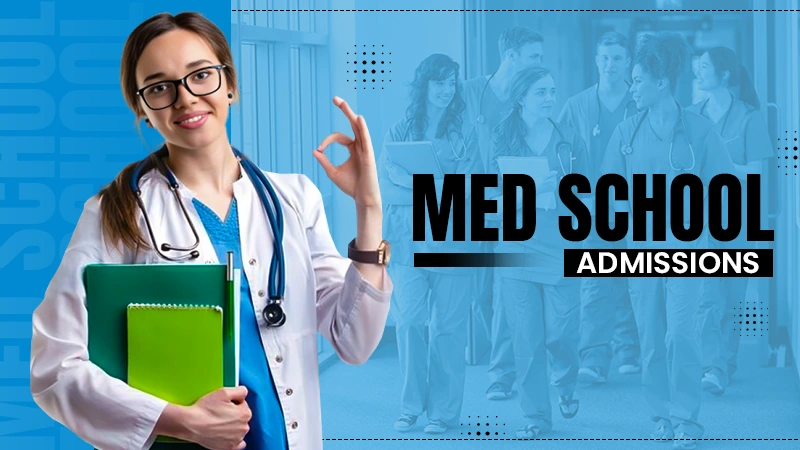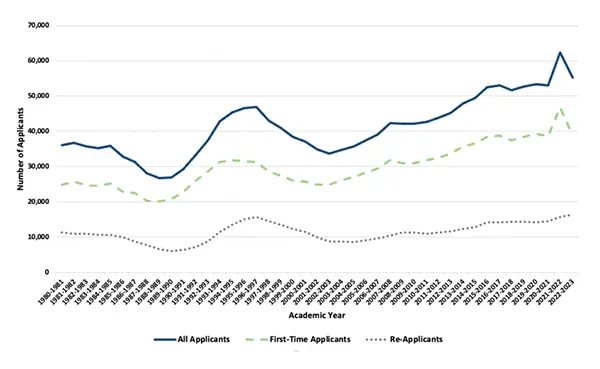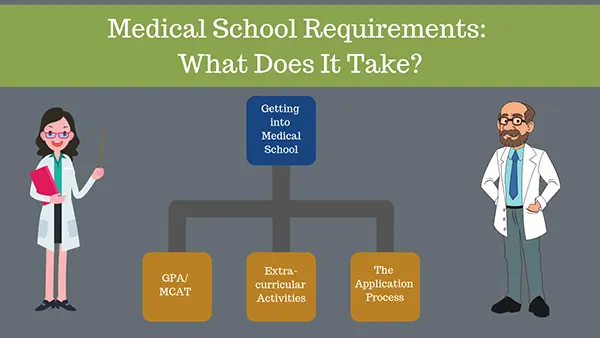
Are you an aspiring college student and willing to become a doctor? We understand that medical schools are highly competitive. Getting into medical school is prohibitively difficult — and for good reason!
According to the data compiled by the Association of American Medical Colleges, the national acceptance rate is 43%.
While it may seem challenging, with hard work and dedication, it’s absolutely possible to get into medical school.
It is even believed that challenges faced by students during the application process are there to ensure that they are ready for the rigors of a future medical career.
To stand out in this competitive field, one needs to keep a few factors that influence med school admissions in mind. Also, they are supposed to develop a strategic approach to their application.
In this guide, we’ll talk about some intricacies of med school admissions and pen valuable insights and practical advice that will help you increase your likelihood of being accepted.
Understanding Med School Admissions
Making an application to medical school is a mile-long race, not a sprint. It includes a thorough evaluation of the applicant’s academic performance, extracurricular activities, personal qualities, and potential for success.
Experts say successful applicants possess GPAs and quality experience in research, shadowing doctors, publishing papers, writing grants, and other practical opportunities. Combining all, a student must show a passion for entering the medical field.
They do all of this when they prepare for the MCAT.
Those credentials “are not accumulated overnight”, says Jagdish Khubchandani, a professor of public health at New Mexico State University.
In essence, it’s a lot of pressure, but so is the medical profession itself. So, the admissions committee is responsible for identifying the most qualified and dedicated candidates.
If you believe, you have the zeal and passion to become a doctor, you’ll definitely excel in your application but in case you are the least confident, you can get help from a reputed med school admission consultant.

Statistics:
As you can see, the total number of applicants to MD-granting med schools peaked in the mid-1990s and then dipped through the early 2000s. Since then, the growth has been steadily rising.
Key Factors in Med School Admissions

Considering med school admissions, a few factors are considered paramount. Those are as follows:
- Extracurricular Activities: It is believed that it is not just about how well you do in science classes or on exams, but it also is about relying on extracurricular activities to see how students spend their time outside the classroom.
In this context, getting shadowing experience is the first clinical step for premed students. This is mostly a hand-off experience where students learn from observing a physician’s daily activities, research experience, volunteer work, leadership roles, or other activities.
- Letters of Recommendation: Another key factor is a letter of recommendation. So, first, figure out exactly who should write your letters. Believe it, this is an extremely vital part of the medical school application process.
The right recommendation letter from professors, mentors, or supervisors might keep your application competitive with applicants having similar credentials. To name some, high GPAs, MCAT scores, etc.
Think strategically about whom to ask for and who can write positively about your academic and personal strengths.
- Interviews: At many medical schools worldwide, interviews are part of the admissions process. This helps to gather and verify information about applicants and recruit students.
Besides, interviews are weighted highly by admissions committees, faculty, and staff, since it allows them to assess their communication skills, personality, and see if the applicant fits with the school’s mission and values.
Do You Know?:
Spanning from the 2013-2014 to the 2022-2023 academic years, the total number of medical school applicants has surged from 48,014 to 55,188 over the past decade, reflecting a substantial 15% increase.
Tips for Increasing Your Chances of Acceptance
Below, you can find some useful tips that will increase your chances of acceptance. Use them to prepare for your pre-health profession:
- Start Early: Your future starts right now. Grab it and go. Preparing in advance is way more beneficial. You can join a pre-health professions club or association at your school to start early.
Doing this will help you to get ready for tests and gain knowledge as well as experience.
Remember what McKenzie said, “take a course and buy books and study on your own. Find the method that works for you. Take practice tests many times and don’t let your practice scores spook you”.
- Prepare for the MCAT: In addition to good grades, a breeze through the Medical College Admission Test (MCAT) is necessary. It is a standardized test that assesses the knowledge and readiness of an applicant for medical school.
So prepare in advance for topics like biology, chemistry, physics, and critical thinking. However, a high MCAT score increases your chances of getting accepted into medical school.
- Get Involved: Getting involved in extracurricular activities is advantageous as mentioned earlier. It includes volunteering at a local hospital or clinic, shadowing a doctor, helping physicians, or joining a pre-med club on campus, etc.
- Take the Right Courses: There are institutions that require specific prerequisite courses that need to be completed before you can apply. Those courses are designed to prepare students with a solid foundation in science and math.
According to the U.S. News & World Report, the courses termed prerequisites for many programs are Biology, Chemistry (Including general chemistry, organic chemistry, and biochemistry), English, Genetics, Math (Including calculus and statistics), Physics, Psychology, and Sociology.
- Stay Organized and Positive: Staying organized means keeping track of deadlines, requirements, and materials. Despite this, negative thoughts are potential roadblocks along the way.
So, keep in mind to stay positive throughout this process and maintain a resilient mindset.
Fast Fact:
The 2020-2021 school year is one of the promising statistics which reported that nearly 54,000 medical school applicants. Amongst them, 43% were accepted.
Conclusion
Getting into medical school was never easy. However, being a bit worried about your likelihood of medical school acceptance is fairly normal. But, it is also not rocket science.
The fact that this process is very competitive but once you crack it, you will be one step ahead of your future.
Each of the factors and tips discussed in this guide demonstrates what it takes to succeed in medical school.